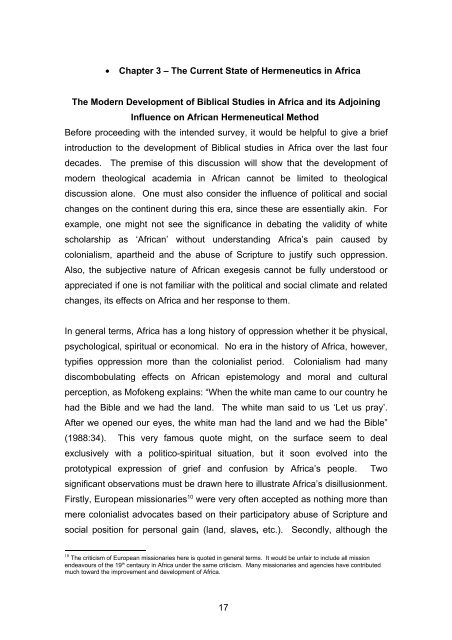African Hermeneutics: The Current State - Theology In Africa
African Hermeneutics: The Current State - Theology In Africa
African Hermeneutics: The Current State - Theology In Africa
Create successful ePaper yourself
Turn your PDF publications into a flip-book with our unique Google optimized e-Paper software.
• Chapter 3 – <strong>The</strong> <strong>Current</strong> <strong>State</strong> of <strong>Hermeneutics</strong> in <strong>Africa</strong><br />
<strong>The</strong> Modern Development of Biblical Studies in <strong>Africa</strong> and its Adjoining<br />
<strong>In</strong>fluence on <strong><strong>Africa</strong>n</strong> Hermeneutical Method<br />
Before proceeding with the intended survey, it would be helpful to give a brief<br />
introduction to the development of Biblical studies in <strong>Africa</strong> over the last four<br />
decades. <strong>The</strong> premise of this discussion will show that the development of<br />
modern theological academia in <strong><strong>Africa</strong>n</strong> cannot be limited to theological<br />
discussion alone. One must also consider the influence of political and social<br />
changes on the continent during this era, since these are essentially akin. For<br />
example, one might not see the significance in debating the validity of white<br />
scholarship as ‘<strong><strong>Africa</strong>n</strong>’ without understanding <strong>Africa</strong>’s pain caused by<br />
colonialism, apartheid and the abuse of Scripture to justify such oppression.<br />
Also, the subjective nature of <strong><strong>Africa</strong>n</strong> exegesis cannot be fully understood or<br />
appreciated if one is not familiar with the political and social climate and related<br />
changes, its effects on <strong>Africa</strong> and her response to them.<br />
<strong>In</strong> general terms, <strong>Africa</strong> has a long history of oppression whether it be physical,<br />
psychological, spiritual or economical. No era in the history of <strong>Africa</strong>, however,<br />
typifies oppression more than the colonialist period. Colonialism had many<br />
discombobulating effects on <strong><strong>Africa</strong>n</strong> epistemology and moral and cultural<br />
perception, as Mofokeng explains: “When the white man came to our country he<br />
had the Bible and we had the land. <strong>The</strong> white man said to us ‘Let us pray’.<br />
After we opened our eyes, the white man had the land and we had the Bible”<br />
(1988:34). This very famous quote might, on the surface seem to deal<br />
exclusively with a politico-spiritual situation, but it soon evolved into the<br />
prototypical expression of grief and confusion by <strong>Africa</strong>’s people. Two<br />
significant observations must be drawn here to illustrate <strong>Africa</strong>’s disillusionment.<br />
Firstly, European missionaries 10 were very often accepted as nothing more than<br />
mere colonialist advocates based on their participatory abuse of Scripture and<br />
social position for personal gain (land, slaves, etc.). Secondly, although the<br />
10 <strong>The</strong> criticism of European missionaries here is quoted in general terms. It would be unfair to include all mission<br />
endeavours of the 19 th centaury in <strong>Africa</strong> under the same criticism. Many missionaries and agencies have contributed<br />
much toward the improvement and development of <strong>Africa</strong>.<br />
17


